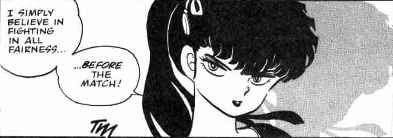
"Watashiwa syourino tameniwa, shiaimaenimo zenryokuwo tsukusu syugi nandesu."
"I do my best for victory even if it is before the game."
Viz Version:
I'm not sure what I was originally going to state with this, I have had it in draft since last July. I got these pictures and the translation from another site. I am pretty sure I was going to make some type of comment but no longer know what, so I just decided to post it.
I think, I might have been planning to explain how Kodachi uses formal language. It is often the case that, the higher up one goes in society, the more formal/humble their language becomes and Kodachi considers herself to have a very high standing in society. Her speech is is generally humble/ self-depreciating whereas her actions are the opposite.
Watashi is a formal, very polite way of referring to yourself. In spoken Japanese you don't usually use I all that much, watashi is a way to make yourself look "lesser" in the eyes of the person you are talking to, or to make the listener feel "above" you. I might have also been planning to add more pictures, showing Kodachi using the even more polite version of "I" watakushi. Though using this picture resolution it would be hard to tell since both watashi and watakushi use the same kanji 私 but the furigana (the smaller Hiragana next to the kanji) would differentiate them. Watashi is わたし , watakushi is わたくし in Hiragana.

3 comments:
It's watashi here, not watakushi (I checked and even in your scan you can see that it can't have more than 3 furigana if you squint your eyes.)
nitpick: I'd translate it as "My philosophy is to do my..." so you don't lose 主義.
Watashi isn't necessarily all that formal, many girls use it even when they aren't using formal language at all, but of course you are right in that if you want to talk formally you need to use watashi or even watakushi.
You are also right that Kodachi uses more fomal language than the other teenagers and there are a couple of good examples in this scene, two pages earlier she uses dewa arimasen (instead of, from least formal to almost as formal janai, janai desu or dewa nai desu)
and two pages later otsuyoi (instead of just tsuyoi) and mairimasu ( instead of kimasu).
Of course she could easily be even more formal, in this sentence for example she could use watakushi instead of watashi as you allude to, or, if she wanted to talk super formally, go as far as replacing nandesu with yue degozaimasu (the meaning is a bit different though).
On a scale from 1 to 10 in formalness I'd say Kodachi is usually around 5-6, and the other characters 1-4 depending on the situation.
We are conflating formal as in being polite and formal as in using big words a bit (or at least I am), but Kodachi does both anyway so it's not a problem ;)
I know it is watashi here, I just mentioned that she sometimes uses watakushi as well. I'm not sure what I was originally going to say with the pictures/translation so just decided to add on that since it was in my draft for a year and I couldn't remember what I originally was going to comment on.
Watashi is somewhat formal more formal than atashi which Akane frequently uses, but I know it is used in regular speech as well. Akane uses it in the first episode when she meets Ranma-onna for example. Nabiki and Kasumi use watashi as well.
Truthfully that isn't the best page from the manga to use because there are examples of Kodachi using more formal language like Watakushi.
My main language is English, I can understand and read some Japanese but not that well. I'm mostly self taught, didn't take a class or anything on Japanese language(when I was in school I took Spanish as my foreign language and Japanese wasn't offered).
Personal pronouns don't really translate to English that well. I've looked at several books and they don't even agree on the meanings of the pronouns all that often. One book for example said that watashi is a female specific pronoun when it isn't, girls are more likely to use it than guys since they generally speak more politely, but guys use it as well. In the manga, Gosungunki, Soun, and the Principal have used watashi. That one book didn't even have washi listed as a pronoun, it is one, Happosai, Cologne (who speaks rather unfemininely), and Genma have used it.
Oh, sorry, I misunderstood you.
I guess you could say watashi is female specific for young people in informal speech . But except for some people who jump straight to watakushi and those who never use any of the words for I everyone would use watashi in some contexts.
Washi is the cliché old men word, if your book doesn't list it it's probably no good for understanding manga "pronouns". I bet it doesn't list historic or dialectal words like wa(re), ora, oira or uchi that frequently appear in manga, either. You probably noticed Mousse uses oira and Ukyou uchi.
Technically speaking modern Japanese doesn't have real pronouns because they behave like perfectly normal nouns grammatically, but I guess using the word pronoun is better than not having a word for what they have instead.
Cologne doesn't so much talk unfemininely as "old". She is older than many of the present gender differences in the Japanese language (there were always differences, but what they are changes constantly). For example washi was mostly used by women in the edo period (and probably also into the meiji period when she might have learned Japanese?) and now is mostly used by old men.
Post a Comment